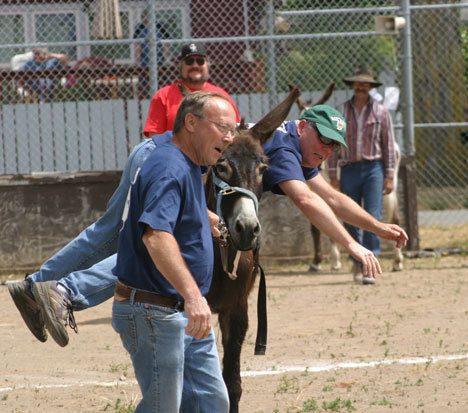Threats of a boycott over alleged mistreatment of animals failed to materialize during the annual donkey baseball game at Dave Mackie Park on Saturday.
Staged as a fundraiser by the South Whidbey Eagles Aerie, Team Red shut out Team Blue 2-0 in a game marked by few hits, lots of errors, a good deal of donkey-human bonding and no observed mistreatment of the animals.
In April, local activist Miriam Coates said that almost every animal- rights organization in the country is against donkey baseball, on the grounds that it amounts to animal cruelty and that it sets a terrible example for youths.
She added that the whole process desensitizes people to the suffering of animals, and announced a boycott of the game in an effort to have it cancelled.
Neither Coates nor any animal rights group representative made their presence known, although they had been publicly invited to attend.
Organizers of the event, however, showed the donkeys they were all heart.
Each player had a heart-emblazoned T-shirt declaring, “Eagles love donkeys.” There were hot dogs for the fans and apples and carrots for the donkeys.
Actually, the term “donkey baseball” is something of a misnomer.
First, it’s played with an oversized ball thrown underhanded.
Second, when all else fails, batters can switch-hit by utilizing a shovel instead of a bat, the theory being that greater surface area equals a higher probability of the ball going somewhere.
But there were real donkeys, transported from their home near Wenatchee in an airy trailer by owner Bruce Wick.
After acquainting the teams with the rules and explaining that each animal has a name, Wick noted that the recent controversy over animal cruelty had produced a new rule this year: “If you hit your donkey with a ball, you have to go and kiss him,” he said.
On this day, no donkeys qualified for a kiss.
The money raised by the Eagles is used to support a variety of local charities, and is the club’s biggest fundraiser. The club charged $9 per person, or $35 for a family pass. Although more than 1,200 tickets were sold, only about 70 fans of the sport showed up to wish their favorites well.
As the game began, seven players stood next to seven donkeys; on each base, in the outfield and at home plate.
The pitcher threw, the batter hit (sometimes) and then mounted a donkey for the trek to first base, guided by a handler to prevent mishaps.
When a fielder got the ball, he or she got on the donkey and threw to the nearest base to tag the runner’s animal out.
All of this was accompanied by hoots of derision or laughter when a player had problems getting on or off his or her trusty steed.
Errors ruled the day. Predictably, batters often tore off to first base before sheepishly returning as realization dawned that the rules were a tad different in this contest.
When it was over, club members retired to their clubhouse for more hot dogs and beer, while the donkeys began their journey back over the mountains.
“Nobody had any problems, except that one guy who hasn’t a clue how to ride a donkey,” said club manager Jeanne Seiler. “But then, who does?”



